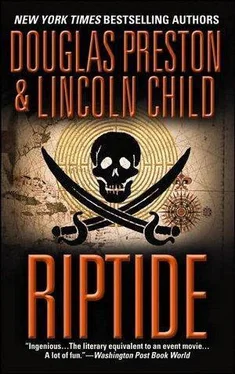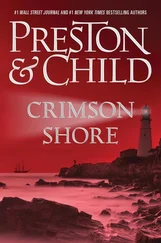Douglas Preston - Riptide
Здесь есть возможность читать онлайн «Douglas Preston - Riptide» весь текст электронной книги совершенно бесплатно (целиком полную версию без сокращений). В некоторых случаях можно слушать аудио, скачать через торрент в формате fb2 и присутствует краткое содержание. Жанр: Триллер, на английском языке. Описание произведения, (предисловие) а так же отзывы посетителей доступны на портале библиотеки ЛибКат.
- Название:Riptide
- Автор:
- Жанр:
- Год:неизвестен
- ISBN:нет данных
- Рейтинг книги:3 / 5. Голосов: 1
-
Избранное:Добавить в избранное
- Отзывы:
-
Ваша оценка:
- 60
- 1
- 2
- 3
- 4
- 5
Riptide: краткое содержание, описание и аннотация
Предлагаем к чтению аннотацию, описание, краткое содержание или предисловие (зависит от того, что написал сам автор книги «Riptide»). Если вы не нашли необходимую информацию о книге — напишите в комментариях, мы постараемся отыскать её.
Riptide — читать онлайн бесплатно полную книгу (весь текст) целиком
Ниже представлен текст книги, разбитый по страницам. Система сохранения места последней прочитанной страницы, позволяет с удобством читать онлайн бесплатно книгу «Riptide», без необходимости каждый раз заново искать на чём Вы остановились. Поставьте закладку, и сможете в любой момент перейти на страницу, на которой закончили чтение.
Интервал:
Закладка:
In 1840, the Boston Salvage Company was formed and began digging a third shaft in the vicinity of the Water Pit. After only sixty-six feet, they unexpectedly struck an ancient side tunnel that appeared to lead from the original Pit. Their own shaft filled instantly with water, then collapsed.
Undaunted, the entrepreneurs dug yet another, very large shaft thirty yards away, which became known as the Boston Shaft. Unlike earlier tunnels, the Boston Shaft was not a vertical pit, but was instead cut on a slope. Striking a spur of bedrock at seventy feet, they angled downward for another fifty feet at enormous expense, using augers and gunpowder. Then they drove a horizontal passage beneath the presumed bottom of the original Water Pit, where they found cribbing and the continuation of the original backfilled shaft. Excited, they dug downward, clearing the old shaft. At 130 feet they struck another platform, which they left in place while debating whether to pull it up. But that night, the camp was awakened by a loud rumble. The diggers rushed out to find that the bottom of the Water Pit had fallen into the new tunnel with such force that mud and water had been ejected thirty feet beyond the mouth of the Boston Shaft. Among this mud, a crude metal bolt was discovered, similar to what might be found on a banded sea chest.
Over the next twenty years, a dozen more shafts were dug in an attempt to reach the treasure chamber, all of which flooded or collapsed. Four more treasure companies went bankrupt. In several cases, diggers emerged swearing that the flooding was no accident, and that the original builders of the Water Pit had designed a diabolical mechanism to flood any side shafts that might be dug.
The Civil War brought a brief respite to the diggings. Then, in 1869, a new treasure-hunting company secured the rights to dig on the island. The dig foreman, F. X. Wrenche, noticed that water rose and fell in the Pit in accordance with the tides, and theorized that the Pit and its water traps must all be connected to the sea by an artificial flood tunnel. If the tunnel could be found and sealed, the Pit could be drained and the treasure removed safely. In all, Wrenche dug more than a dozen exploratory shafts of varying depths in the vicinity of the Water Pit. Many of these shafts encountered horizontal tunnels and rock "pipes," which were dynamited in an attempt to stop the water. However, no flood tunnel to the sea was ever found and the Water Pit remained flooded. The company ran out of money and, like those before, left its machinery behind to rust quietly in the salt air.
In the early 1880s, Gold Seekers Ltd. was formed by a consortium of industrialists from Canada and England. Powerful pumps and a new kind of drill were floated out to the island, along with boilers to power them. The company tried boring several holes into the Water Pit, finally hitting pay dirt on August 23, 1883. The drill came up against the plate of iron that had defeated Parkhurst's drill fifty years before. A new diamond bit was fitted and the boilers were stoked to a full head of steam. This time the drill bored through the iron and into a solid block of a softer metal. When the corer was extracted, a long, heavy curl of pure gold was found inside its grooves, along with a rotten piece of parchment with two broken phrases: "silks, canary wine, ivory" and "John Hyde rotting on the Deptford gibbet."
Half an hour after the discovery was made, one of the massive boilers exploded, killing an Irish stoker and leveling many of the company's structures. Thirteen were injured and one of the principals, Ezekiel Harris, was left blinded. Gold Seekers Ltd. followed its predecessors into bankruptcy.
The years immediately before and after 1900 saw three more companies try their luck at the Water Pit. Unsuccessful in duplicating the discovery of Gold Seekers Ltd., these companies used newly designed pumps in concert with randomly placed underwater charges in an attempt to seal and drain the waterlogged island. Working at their utmost capacity, the pumps were able to lower the water level in several of the central shafts by about twenty feet at low tide. Excavators sent down to examine the condition of the pits complained of noxious gases; several fainted and had to be hauled to the surface. While the last of the three companies was at work in early September 1907, a man lost one arm and both legs when an explosive charge went off prematurely. Two days later, a vicious Nor'easter howled up the coast and wrecked the primary pump. Work was abandoned.
Although no more companies came forward, individual diggers and enthusiasts still occasionally dared to try their hands at exploratory tunnels. By this time, the original location of the Water Pit had been lost among the countless flooded side shafts, holes, and tunnels that riddled the heart of the island. At last the island was abandoned to the ospreys and the chokecherry bushes, its very surface unstable and dangerous, shunned by the mainland townspeople. It was in 1940 that Alfred Westgate Hatch, Sr., a young, wealthy New York financier, brought his family to Maine for the summer. He learned of the island and, growing intrigued, researched its history. Documentation was spotty: none of the previous companies had bothered to keep careful records. Six years later, Hatch purchased the island from a land speculator and moved his family to Stormhaven.
As had so many others before him, A. W. Hatch, Sr., became obsessed with the Water Pit and was ruined by it. Within two years the family s finances had been drained and Hatch was forced to declare personal bankruptcy; he turned to drink and died soon after, leaving A. W. Hatch, Jr., at nineteen, the sole support for his family.
Chapter 1
July 1971
Malin Hatch was bored with summer. He and Johnny had spent the early part of the morning throwing rocks at the hornet's nest in the old well-house. That had been fun. But now there was nothing else to do. It was just past eleven, but he'd already eaten the two peanut-butter-and-banana sandwiches his mother had made him for lunch. Now he sat crosslegged on the floating dock in front of their house, looking out to sea, hoping to spot a battleship steaming over the horizon. Even a big oil tanker would do. Maybe it would head for one of the outer islands, run aground, and blow up. Now that would be something.
His brother came out of the house and rattled down the wooden ramp leading to the dock. He was holding a piece of ice on his neck.
"Got you good," Malin said, secretly satisfied that he had escaped stinging and that his older, supposedly wiser, brother had not.
"You just didn't get close enough," Johnny said through his last mouthful of sandwich. "Chicken."
"I got as close as you."
"Yeah, sure. All those bees could see was your skinny butt running away." He snorted and winged the piece of ice into the water.
"No, sir. I was right there."
Johnny plopped down beside him on the dock, dropping his satchel next to him. "We fixed those bees pretty good though, huh, Mal?" he said, testing the fiery patch on his neck with one forefinger.
"Sure did."
They fell silent. Malin looked out across the little cove toward the islands in the bay: Hermit Island, Wreck Island, Old Hump, Killick Stone. And far beyond, the blue outline of Ragged Island, appearing and disappearing in the stubborn mist that refused to lift even on this beautiful midsummer day. Beyond the islands, the open ocean was, as his father often said, as calm as a millpond.
Languidly, he tossed a rock into the water and watched the spreading ripples without interest. He almost regretted not going into town with his parents. At least it would be something to do. He wished he could be anywhere else in the world—Boston, New York—anywhere but Maine.
Читать дальшеИнтервал:
Закладка:
Похожие книги на «Riptide»
Представляем Вашему вниманию похожие книги на «Riptide» списком для выбора. Мы отобрали схожую по названию и смыслу литературу в надежде предоставить читателям больше вариантов отыскать новые, интересные, ещё непрочитанные произведения.
Обсуждение, отзывы о книге «Riptide» и просто собственные мнения читателей. Оставьте ваши комментарии, напишите, что Вы думаете о произведении, его смысле или главных героях. Укажите что конкретно понравилось, а что нет, и почему Вы так считаете.












